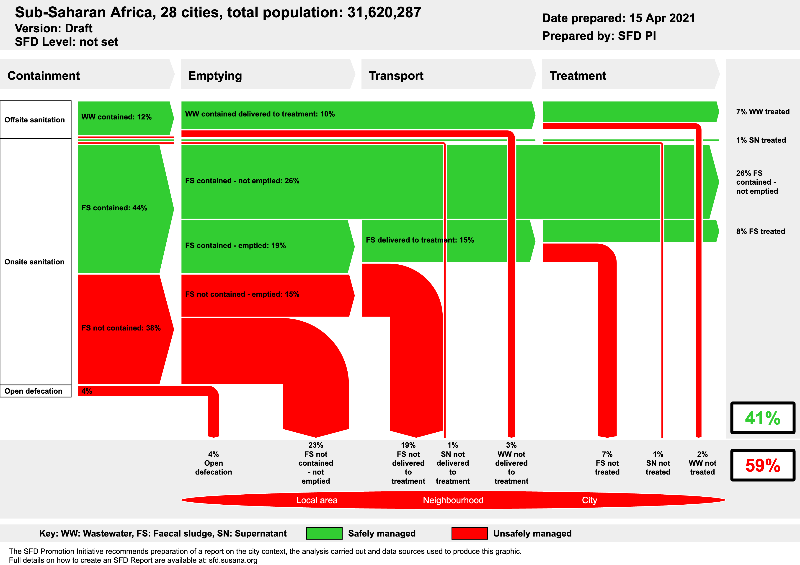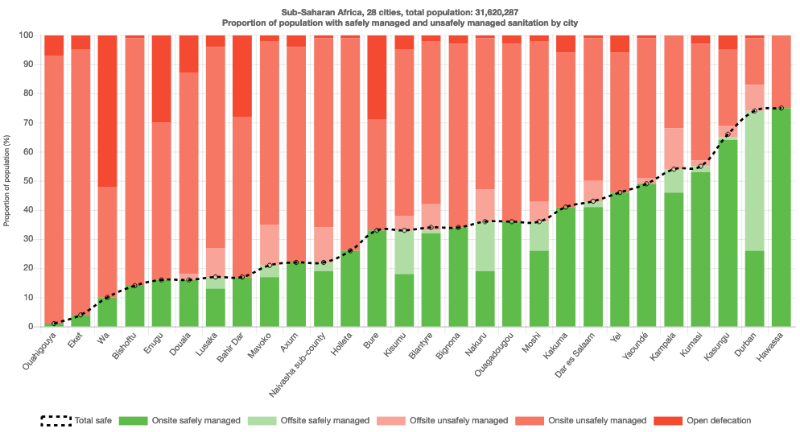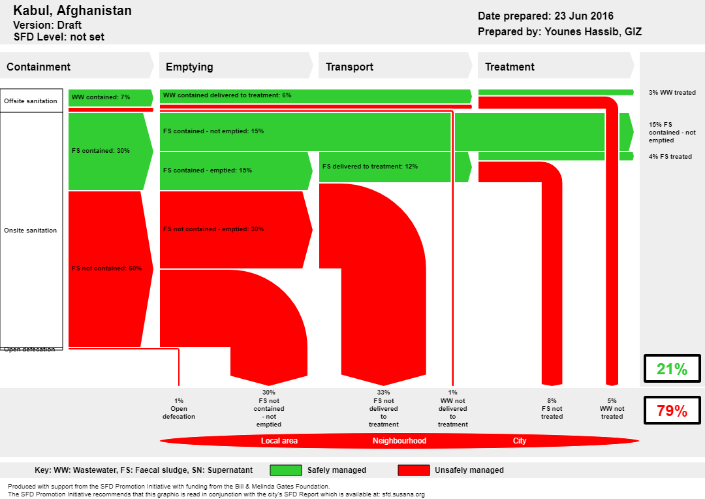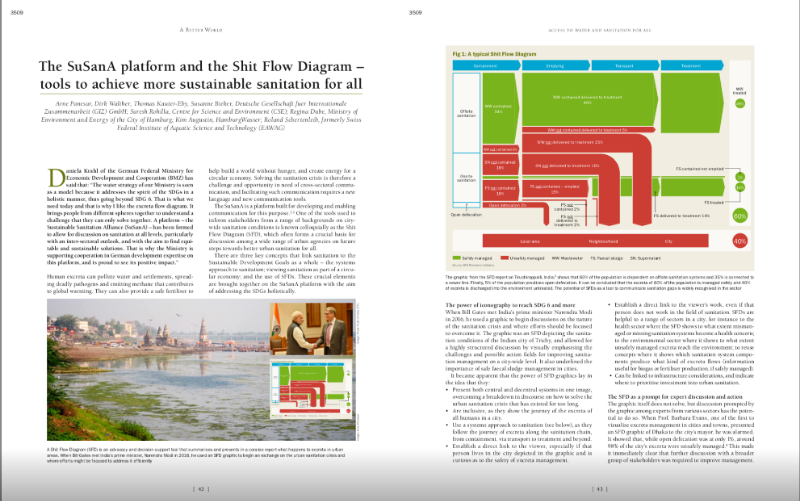- Markets, finance and governance
- Cities (planning, implementation, and management processes)
- Shit flow diagrams (SFDs) / Excreta flow diagrams
- SFD Promotion Initiative (SFD PI) - Project Updates (Shit Flow Diagrams)
SFD Promotion Initiative (SFD PI) - Project Updates (Shit Flow Diagrams)
88.2k views
- andypeal
-
 Less
Less- Posts: 7
- Likes received: 11
Re: SFD Promotion Initiative (SFD PI) - Project Updates (Shit Flow Diagrams)
NEW sanitation system drawings added to the SFD graphic generator
A quick update to confirm that there are now 'pop-up' sanitation system drawings to help with system selection when using the SFD graphic generator.
This means that when selecting sanitation systems for a new SFD, you can see what each one looks like and decide which match the situation in your city - see example below.
A BIG thank you to the artist James McKay of University of Leeds for producing the drawings - we think they are great!
Please take a look and let us know what you think?
Kind regards,
SFD PI Phase 3 team
Attachments:
-
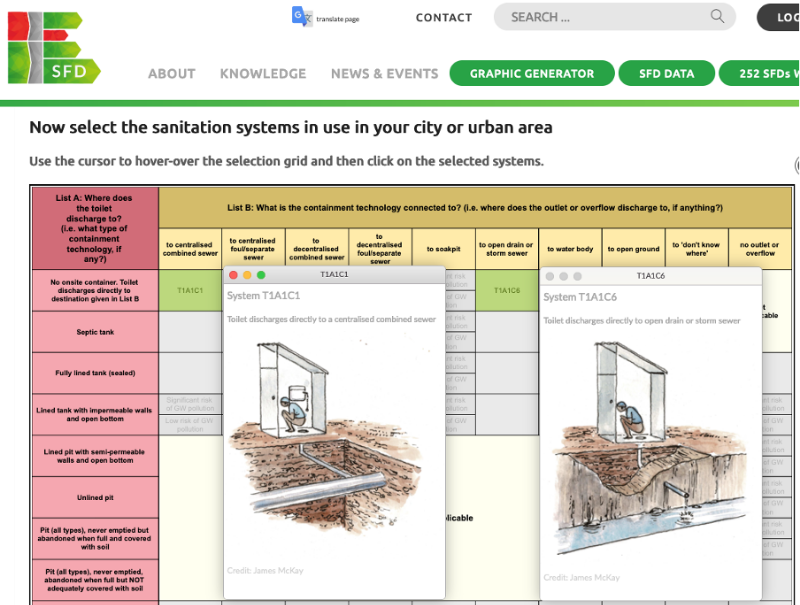 SFDdrawing...page.png
(Filesize: 299KB)
SFDdrawing...page.png
(Filesize: 299KB)
Please Log in to join the conversation.
You need to login to reply- paresh
-

- Moderator
- Budding WASH researcher, especially interested in governance, public policy, finance, politics and social justice. Architect, Urban & Regional planner by training, Ex. C-WAS, India.I am a patient person :)
Less- Posts: 383
- Karma: 7
- Likes received: 143
Re: SFD Promotion Initiative (SFD PI) - Project Updates (Shit Flow Diagrams)
The interactive data page looks very cool and very fast; must have been a lot of programming work. I think it will be very useful for regional and global monitoring of SDG sanitation targets.
I could quickly prepare a SFD for India (based on 67 city reports). I don't think the numbers agree with reports by the pollution control board, but understand that they will get near as more reports are added.
For a country like India, the possibility of province level comparison is also very useful. Wondering if it could somehow be connected to CEPT's work (they annually collect information to assess city level performance for 1000+ cities). That will not only enable annually updated SFDs of the cities, but also useful for monitoring at regional (intra and inter state) level.
Regards
paresh
Moderator, SuSanA forum
Project Manager at ADCPS
Indian Institute of Technology - Bombay, India
Attachments:
-
 India.png
(Filesize: 94KB)
India.png
(Filesize: 94KB)
Please Log in to join the conversation.
You need to login to reply- andypeal
-
 Less
Less- Posts: 7
- Likes received: 11
Re: SFD Promotion Initiative (SFD PI) - Project Updates (Shit Flow Diagrams)
NEW Interactive SFD Data page is now LIVE!
A quick update to confirm that the new SFD Data page is now up and running on the SFD web portal (see our post of 19th March).
This means that you can now compare SFD data from over 150 cities, either on an SFD graphic or using bar charts. And as well as looking at individual city data, you can agglomerate the city data by state, country or region, and prepare a multi-city SFD graphic, as in the example below.
Please take a look at the page and interrogate the data... and then let us know what you think?
And why not make an SFD for your city and add it to the database?
Kind regards,
SFD PI Phase 3 team
Attachments:
Please Log in to join the conversation.
You need to login to reply- andypeal
-
 Less
Less- Posts: 7
- Likes received: 11
Re: SFD Promotion Initiative (SFD PI) - Project Updates (Shit Flow Diagrams)
With World Water Day 2021 celebrations this coming Monday 22nd March, the SFD Promotion Initiative (SFD-PI) team is delighted to share news of the third and final phase of the SFD PI, and what they have been doing since the last update in September 2020.
Coming soon…NEW interactive SFD Data page
We are excited to announce that the new interactive SFD Data page will soon be online. Users of the new page will be able to select more than one city and:
- Make a multi-city SFD graphic (for example for a state, country, state, region or population range); and
- Draw bar charts for the selected cities, enabling quick comparison of the key outcomes (for example, the proportions safely managed and unsafely managed by city).
Example of a multi-city SFD graphic, automatically generated by the new interactive SFD Data page
Example of a multi-city SFD chart, automatically generated by the new interactive SFD Data page
There are now over 140 city level reviewed SFD reports on the web portal, which you can quickly access through searching by city name, state, country or region, and new filters will also allow you to search by SFD level, which organisation prepared it and by the year prepared.
We’ll post an update when the new page is online, please then take a look and let us know what you think of the new page.
New help videos online
In September we held an SFD stakeholders meeting to consult with SFD and sanitation experts on their views on proposed data entry tools and improvements to the SFD process. The day-long meeting was a great success and we learnt a lot about users’ experiences; you can read the meeting report here .
So far, we have responded by making available six new explainer videos that are all available on the SFD web portal . Please take a look and let us know whether you find them helpful?
The subjects they cover are:
- How to get started making an SFD Report and Graphic
- How to edit an SFD Graphic image
- How to use the risk of groundwater pollution assessment tool
- Understanding step two of the SFD Graphic Generator and how to “estimate the proportion of tank and pit contents which is faecal sludge”
- How to save an SFD Graphic image
- How to use the SFD Graphic Generator for scenario planning
Screenshot of one of the new explainer videos
Updated SFD Report Templates and new SFD Graphic Generator features
We have also updated the SFD Report templates to make them clearer for users. You can find these here .
And to make it even easier to use the SFD graphic generator, we are adding more details to the user interface. These include drawings of each system on the selection grid, and clearer annotations and system calculations on the matrix. Look out for these new features in the next month or so, which we hope will further help with improving understanding.
Screen shot of the proposed revised SFD Matrix, showing new column headings and new classification column
(NOTE: importantly, we are only improving the user interface, we are not changing any of the definitions, assumptions or how the generator does the calculations, these all remain the same).
New SFD Reports online
Since the last update a further 34 SFD Reports have been added to the SFD web portal, many of these have been facilitated by CSE, India and we are very grateful for their continued collaboration. The recently added cities are:
- India: Ahraura, Aya Nagar, Bakshi Ka Talab, Barwar, Bhagalpur, Bijnor (vn 2020), Bithoor, Chunar (vn 2020), Cuttack (vn 2020), Dharamshala, Faridabad, Haldia, Indore, Jamalpur, Jammu, Jhansi, Kanpur, Lakhimpur, Lucknow, Mandapeta, Nashik, Noorpur, Prayagraj, Sirsa, Tinsukia and Unnao;
- Nepal: Dhulikhel, Lahan (vn 2020), Kathmandu-Valley and Waling.
- Bangladesh: Bhola and Rangpur; and
- Eket, Nigeria.
Have you worked on an SFD? If so, we need your help!
One of our aims is to increase the number of cities on the SFD web portal database and are therefore actively searching for new SFDs made by individuals, organisations and/or institutions.
If you have worked on an SFD that is not on the web portal, or know of an SFD that could be uploaded to the web portal, we would love to hear about it. If so, please contact Jemma Phillips at This email address is being protected from spambots. You need JavaScript enabled to view it. and we’ll get back to you. We look forward to hearing from you!
You can follow our latest news on Twitter @SFD_PI
And if you have any questions or comments please contact us at This email address is being protected from spambots. You need JavaScript enabled to view it.
Happy World Water Day and kind regards,
SFD PI Phase 3 team
Attachments:
Please Log in to join the conversation.
You need to login to reply- andypeal
-
 Less
Less- Posts: 7
- Likes received: 11
Re: SFD Promotion Initiative (SFD PI) - Project Updates (Shit Flow Diagrams)
Thanks for your question and apologies for the long delay in replying.
You make a good point about the importance of local consultants and local authorities using the SFD tools to make SFD Reports and Graphics to support advocacy and sanitation decision making. That is certainly the intention and how the SFD tools are designed, and I can confirm the majority (of the 140 or so SFD reports on the web portal) have been done by local actors following the guidance on the SFD web portal and/or a short training course. Only the first 50 SFDs were produced with support from the SFD PI consortium and with funding from the BMGF (back in 2015/16).
And I totally agree with your point, if change is to happen (which is practical and affordable in the long term), it has to start and be owned at the local level. As we all well know, that is no easy task, but hopefully in some locations the SFD tools can help that to happen.
Thanks and best regards,
Andy
Please Log in to join the conversation.
You need to login to reply- paresh
-

- Moderator
- Budding WASH researcher, especially interested in governance, public policy, finance, politics and social justice. Architect, Urban & Regional planner by training, Ex. C-WAS, India.I am a patient person :)
Less- Posts: 383
- Karma: 7
- Likes received: 143
Re: SFD Promotion Initiative (SFD PI) - Project Updates (Shit Flow Diagrams)
Thankyou for the update and a big congratulations!! The opportunity of mainstreaming the tool at the local and global levels is sure an indication of the utility of the tool. As your paper demonstrates, it is extremely useful to track progress of SDG target 6.2 at the sub-national, national, regional and global levels.
I am curious to know more about the strategy or discussion around more local consultants using the tool for planning FSM or sanitation interventions. My understanding is a currently many of the SFD reports are prepared by a few organisations funded for the purpose. (I am sure this is the case in India, may be a different story in other regions.) The reason I feel this is important is many cities of the Global South are likely to plan FSM sooner than later to achieve SDG target and it should be local consultants who should be involved in planning.
Regards
paresh
Moderator, SuSanA forum
Project Manager at ADCPS
Indian Institute of Technology - Bombay, India
Please Log in to join the conversation.
You need to login to reply- andypeal
-
 Less
Less- Posts: 7
- Likes received: 11
Re: SFD Promotion Initiative (SFD PI) - Project Updates (Shit Flow Diagrams)
We are delighted to be able to share the news that the third and final phase of the SFD PI has started. Read on to learn about the new phase and what has been going on since the last update in March 2019.
What is Phase 3 all about?
Over the past five years, significant investment was made to develop the SFD tools which can be used to support rapid but reliable assessments of sanitation status in urban areas. Investments have included the development of a website, manual and online support tools (including, FAQs, a graphic generator, video-based training materials, online training modules and a searchable database of examples). This effort was led and hosted by GIZ on the SuSanA platform. The Promotion Initiative also rolled out training to a large number of practitioners and as a result there are now 118 SFD Reports on the SFD web portal.
In this final phase of the investment, the aim is to embed the approach within major WASH organisations and optimise the chances of the approach being institutionalised in the sector. This will be achieved through five principal work packages, which aim to:·
- Maintain the permanent SFD platform on the SuSanA website
- Further develop functionality for the creation and storage of SFDs
- Develop mechanisms and guidance which enables national government to use data from SFD analysis to contribute to an understanding of city or national progress towards SDG 6.2
- Finalise, maintain and embed an interactive dashboard which tracks and reports on overall results of SFD analyses; and
- Continue to increase the number of SFDs that are created and can be searched.
With funding from the Bill and Melinda Gates Foundation (BMGF), the new investment will be delivered over two years and led by the University of Leeds. Partners will be GIZ, who continue to host, maintain and manage the SFD web portal on the SuSanA website, Swiss Federal Institute of Aquatic Science and Technology (EAWAG), who will lead on the research scoping exercise, and Centre for Science and Environment (CSE). CSE will also be carrying out SFD-related work in India and Africa under a separate grant from BMGF, you can read more about their activities here . All four institutional partners will contribute to the management committee providing oversight to the grant.
Event reports
SFD PI Phase 3 start up and planning meeting 28-29th January 2020
The University of Leeds hosted members of the Phase 3 team and members of the steering committee for a two-day official start up and forward planning event. The team discussed the project objectives and planned activities through 2020.
WHO/UNICEF JMP Virtual Expert Group Meeting on Safely Managed Onsite Sanitation (SMOSS) 24-26th March 2020
With a key objective of Phase 3 being to help enable national governments to use data from SFD analysis to track progress towards SDG 6.2, the University of Leeds was proud to host the WHO/UNICEF Joint Monitoring Programme’s three-day meeting on safely managed onsite sanitation. Due to the coronavirus outbreak the meeting was held virtually with 55 participants from 18 countries. Participants discussed viable methods for routine data collection of excreta containment, emptying, transport and treatment services; and reviewed plans for upcoming SMOSS pilots in Bangladesh, Ecuador, Indonesia, Kenya, Serbia and Zambia. During phase 3, the SFD team intends to collaborate with JMP to pilot co-production of SFD and JMP data in one of the six SMOSS pilot countries.
Ongoing collaboration with BMGF-supported tools teams
In phase 3 we are holding monthly meetings with other actors working on urban sanitation planning tool design and implementation with the foundation. These include representatives from the FSM Alliance and Athena Infonomics. These knowledge sharing events will help improve coordination of these similar BMGF activities, which are aimed at improving urban sanitation service delivery.
Have you worked on an SFD? If so, we need your help!
Our aim is to increase the number of cities on the SFD web portal database and are therefore actively searching for new SFDs made by individuals, organisations and/or institutions.
If you have worked on an SFD that is not on the web portal, or know of an SFD that could be uploaded to the web portal, we would love to hear about it.
If so, please contact Jemma Phillips at This email address is being protected from spambots. You need JavaScript enabled to view it. and we’ll get back to you.
We look forward to hearing from you!
Upcoming events
Enhancing user experience virtual meeting
An SFD stakeholders meeting is planned for early September to consult with SFD and sanitation experts on their views on proposed data entry tools, which will improve functionality for creation and storage of SFDs. In the next update we’ll let you know how it went.
Phase 1 and 2 SFD Reports online
Since the last SFD PI update a further 33 SFD Reports have been added to the SFD web portal. There are now a total of 118 reviewed SFD reports on the web portal and all are available at sfd.susana.org .
The recently added cities are:·
- In Nepal: Bhaktapur, Budhanilkantha, Chandragiri, Dakshinkali, Godawari, Gokarneshwor, Kathmandu, Lalitpur, Mahalaxmi, Shankharapur, Suryabinayak, Changunarayan Municipality, Lamahi, Bheemdatt, Kageshwori Manohara, Kirtipur, Madhyapur Thimi, Nagarjun, Tarakeshwor and Tokha;
- In India: Bansberia , Bijnor, Coimbatore, Kalpetta, Kannur, Siddipet, Bangalore, Mysuru, Rajgir and Sircilla; plus
- Mandalay, Myanmar; Naivasha, Kenya; and Tarija, Bolivia
Lessons learned from Phases 1 and 2
Did you know that the lessons learned from implementation of the SFD production process during phases 1 and 2 is fully described in a peer-reviewed paper? It was published in the January edition of Frontiers in Environmental Science and you can find it here in the library .
You can follow our latest news on Twitter @SFD_PI
And if you have any questions or comments please contact us at This email address is being protected from spambots. You need JavaScript enabled to view it.
Kind regards,
SFD PI Phase 3 team
Attachments:
-
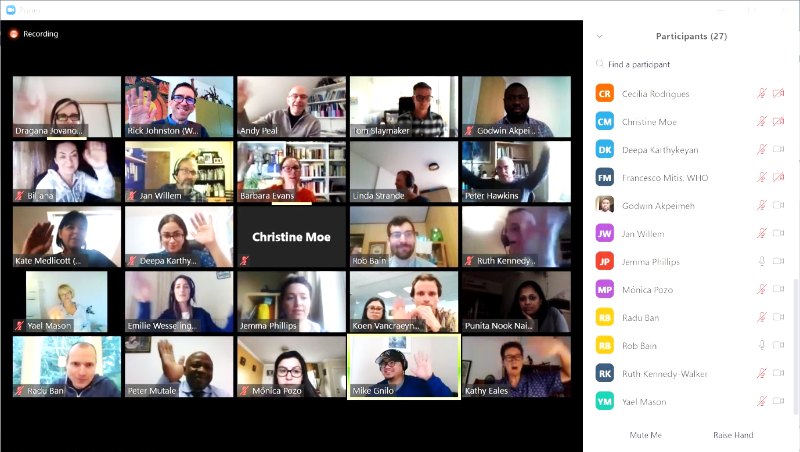 OngoingCol...tion.png
(Filesize: 432KB)
OngoingCol...tion.png
(Filesize: 432KB)
Please Log in to join the conversation.
You need to login to reply- Elisabeth
-
- User is blocked
- Freelance consultant since 2012
Less- Posts: 3372
- Karma: 54
- Likes received: 932
Re: SFD Promotion Initiative (SFD PI) - Project Updates (Shit Flow Diagrams)
Peal, A., Evans, B., Ahilan, S., Ban, R., Blackett, I., Hawkins, P., Schoebitz, L., Scott, R., Sleigh, A., Strande, L., Veses, O. (2020). Estimating Safely Managed Sanitation in Urban Areas - Lessons Learned From a Global Implementation of Excreta-Flow Diagrams. Front. Environ. Sci. 8:1. doi: 10.3389/fenvs.2020.00001
www.susana.org/en/knowledge-hub/resource...library/details/3848
From the abstract:
Funding:This paper describes a methodology for rapid assessment of sanitation in cities including a graphical representation (a shit-flow diagram or SFD) and reports on findings from implementation in 39 cities. The SFD provides high level information for planning purposes covering the entire sanitation system in a city. More than half of the human excreta produced in these cities is not safely managed. The most significant portions of the unsafely managed excreta are: (i) contents of pits and tanks which are not emptied and are overflowing, leaking, or discharging to the surrounding environment (14%); (ii) contents of pits and tanks which are emptied but not delivered to treatment (18%); (iii) fecal sludge and supernatant delivered to treatment but not treated (3%); (iv) wastewater in sewers not delivered to treatment (14%); and (v) wastewater delivered to treatment but not treated (6%). Many cities currently relying on onsite sanitation for safe storage, particularly in Africa, will need new strategies as populations grow. Containment systems that discharge to open drains are common in some Asian cities; these pose a public health risk. Dumping of excreta is widespread and there is a lack of realistic performance data on which estimates of the extent and effectiveness of treatment can be made. The SFD production process can be challenging due to a lack of data and low technical capacity in cities. There is often uncertainty over terminology and over the status of infrastructure. Formalizing definitions for the SFD preparation process was found to be useful in overcoming capacity constraints in cities. The SFD produces a credible snapshot of the sanitation situation in a city. The paper provides evidence of the urgent need for improved management and monitoring of urban sanitation in cities around the world and highlights the role of the SFD as a planning tool.
The work described in this paper was funded by the Bill & Melinda Gates Foundation under grant agreement SFD v1 (OPP1118283) and SFD v2 (OPP1140623). Funding for open access publishing of results from this grant is also financed under separate funding arrangements provided by the Bill & Melinda Gates Foundation.
The paper lists 3 failure modes for onsite sanitation:
- Failure Mode 1—Fecal Sludge Not Contained and Not Emptied From Onsite Sanitation Systems
- Failure Mode 2—Fecal Sludge and Supernatant Emptied/Discharged From Onsite Sanitation, but Not Delivered to Treatment
- Failure Mode 3—Fecal Sludge and Supernatant From Onsite Sanitation Delivered to Treatment, but Not Treated
- Failure Mode 4—Wastewater From Offsite Sanitation Systems Not Delivered to Treatment
- Failure Mode 5—Wastewater From Offsite Sanitation Systems Delivered to Treatment, but Not Treated
Elisabeth
P.S. Some critical aspects about SFDs were discussed here on the forum: forum.susana.org/204-shit-flow-diagrams-...sanitation-dialogues
Freelance consultant on environmental and climate projects
Please Log in to join the conversation.
You need to login to reply- Mintje
-
 Less
Less- Posts: 21
- Karma: 2
- Likes received: 16
Re: SFD Promotion Initiative (SFD PI) - Project Updates (Shit Flow Diagrams)
Dear SuSanA Forum Users,
The SFD Promotion Initiative (SFD-PI) would like to share with you some results of our work, which kept us busy in the past months.
Wrapping up the Phase 2 of the SFD Promotion Initiative
After three years of hard work and intense collaboration, the Phase 2 of the SFD-PI has ended in October 2018. We are happy about the contributions and exchange with all of you in the past years.
The partners of the SFD-PI will continue to promote the SFD approach and to contribute to the better understanding of the path and fate of excreta flows in cities. The SFD web portal as part of the SuSanA platform will remain our key communication channel for updates on recent activities, news and events. We will be happy collaborate with individuals and organizations wanting to produce SFD graphics and reports in the future. Stay tuned for new developments and new SFDs for cities and towns all over the world!
Event reports
Training during WEDC Conference, Nakuru, Kenya
As part of the WEDC Conference 2018 held in Nakuru, Kenya, a capacity development workshop on SFDs was led by the SFD-PI. Trainers from WEDC, GIZ and Leeds University delivered this half-day workshop on the 9th of July. The training focused on understanding of SFDs and on the example of Nairobi, Kenya. Caroline Kabaria, PhD, from the African Population and Health Research Center (APHRC) and Alex Manyasi from Sanergy, presented the process, outcomes and potential impacts of preparing a SFD in Nairobi. The workshop was a success, where participants enjoyed discovering SFDs and being able to use the graphic generator through an exercise. They found it of high quality and relevant to their work.
Pictures of the SFD Capacity Development Workshop during WEDC Conference, Nakuru, Kenya
Series of trainings with AfWA (Abidjan, Kampala, Lusaka, Bamako, Yaoundé)
During the summer 2018, the SFD-PI collaborated with the African Water Association (AfWA) to led a series of SFD trainings, as part of AfWA’s RASOP Project (Strengthening the capacities of African sanitation operators through Peer Learning Partnerships). Five trainings were organized in five different cities: Abidjan (25th June 2018), Kampala (25-26th July 2018), Lusaka (31st July-1st August 2018), Bamako (support only, 9-10th August 2018) and Yaoundé (21-22nd August 2018). They aimed at reinforcing the capacities of sanitation stakeholders for the five countries. Participants were working for various institutions and organizations: ministries, water and/or sanitation utilities, municipalities, development agencies, non-governmental organizations, etc. During these five trainings, participants were trained on SFDs, their process, uses and on how to prepare their own SFD.
Four of these five trainings lasted two days, which allowed for extensive participation of participants and hands-on exercises. Most participants felt capable of using and passing on their new knowledge after the training.
Pictures from the SFD training in Abidjan, Ivory Coast, 25th June 2018
SFD Webinars
Within September 2018, CSE organized two webinars on the 14th and 28th. The first webinar was titled “Different Variations of SFDs” and was aimed at bringing SFD developers together to discuss the differences in the various aspects of SFDs such as the methodology. The second webinar titled “Various Applications of SFDs” was aimed at discovering further possibilities of application of SFDs. Both webinars can be found within the SFD Resources .
SFDs at the Stockholm World Water Week
The SFD-PI officially launched the SFD online training at the Stockholm World Water Week in August 2018. A session was held at the SuSanA booth to enable delegates of the conference to experience the new training first-hand, and to understand how the online training will be able to assist them in producing their own SFDs in the future. A further session by the SFD-PI was run to allow delegates to raise any issues or problems that they have encountered during their involvement with the SFD creation.
At the conference, SFDs were discussed within the session “Sanitation in small towns: challenges for the environment and development”, where participants were invited to join five discussion tables on financial viability of sanitation services; Capacity building; Incentives for small towns; Sustainability of service: monitoring and evaluation, and equity aspects in small towns. At the latter, SFDs and their potential to analyse and highlight equity aspects were explored based on research done by Zachary Burt (Columbia University) in three urban areas in India in collaboration with GIZ. Part of the work is dealing with the question on how equity aspects could best be integrated in the SFD graphic.
The SFD was also presented within the session “Faecal waste and its mysterious movement through urban ecosystems” by GIZ and CSE. During this session, discussions were held on how research on faecal flow pathways can positively support practice and policy.
Resources Updates
SFD Online Survey
In April 2018, the SFD-PI launched an online survey. The survey ran for three weeks and collected opinions and feedback on different aspects of the SFD project, including the web portal, the manual, various tools, the activities developed by the SFD-PI and the use of SFDs in general. The output of this survey is valuable to the SFD-PI for improving the tools and methods available as well as the overall approach of the SFD-PI. Thanks go to all the people who have taken the time to answer it.
This survey has proved to be very informative for the SFD Promotion Initiative. The key points identified from the survey responses are:
1) Human interaction has been the main vector of dissemination of the SFD methodology (discussions on SuSanA website, conferences, word of mouth).
2) Most respondents who prepared an SFD had support from the SFD-PI (training, online and in-field support). This support was found very useful to produce an SFD.
3) All tools are seen as useful, user-friendly and accessible.
4) The visibility of the SFD tools is limited, causing low use.
5) Language of the tools limits their accessibility and uses.
Following this survey, the SFD Promotion Initiative has taken measures to ensure a better experience for SFD users. This includes:
a) Increase promotion of SFD tools, especially through the new SFD Website;
b) Encourage submission of SFD reports by respondents who prepared an SFD that is currently not included on the website’s worldwide database;
c) Encourage the use of Report Templates by SFD users;
d) Translate tools into other languages; and
e) Review how to improve the identification of sanitation systems, based on the SFD methodology.
The survey report can be found here .
Updated SFD Report Templates
New templates for SFD reports ( SFD Report Template , SFD Lite Report Template ) and complementing Guidance notes ( SFD Report – Guidance Note , SFD Lite Report - Guidance Note ) were produced and released on Tools and Report Templates on the SFD Portal.
SFD Manual in French / Arabic now available!
To reach a wider community, the SFD Manual was recently released in French ( Manuel d’élaboration des SFD ) and Arabic .
New guidance material available!
Based on frequent questions that we receive via the SFD Helpdesk, the SFD-PI prepared and uploaded three additional guidance material to support the preparation of SFDs using the SFD Graphic Generator (SFD GG):
1. Step 1 - Sanitation system classification tool : Selecting the most appropriate sanitation systems from the SFD Selection Grid is not always straightforward. The purpose of this classification tool is to help SFD producers select the most appropriate sanitation. By answering a series of questions on the types of sanitation technologies (toilets, sewers, septic tanks, pits, open drains etc) in use in their city and how they function, the tool will help identify which sanitation system to select from the selection grid. Access the Sanitation system classification tool
2. Step 2 - Understanding the SFD Graphic Generator , since the use of the Graphic Generator can be a bit confusing.
3. Downloading / uploading JSON files
How to download / upload SFD JSON files? – Do you know that you can save a local copy of the SFD Graphic that you are working on and resume your work on a later point? It is a cool feature of the SFG Graphic Generator. For that, you will need to download a JSON file. This document will show you step by step how to download the all the files generated by the SFD GG.
SFD Online Training
The SFD-PI is very happy to announce the launch of the SFD Online Training. Developed by WEDC, it is now available on our web portal here .
The aim of this training is to give a thorough introduction into SFDs. It teaches you key points regarding what SFDs are, what they can be used for, how to read a SFD, how to create a SFD report and a SFD Graphic, and how to submit your SFD for review. Composed of seven short modules, SFD beginners and SFD users in need of a reminder should find our new online training very useful! Let us know what you think of it!
SFD Dashboard
The SFD Data page, gives an overview of the current set of data for all cities covered by an SFD. The automatically generated graphs show the compiled data for all cities and allow for comparing key features of the SFDs across regions and topics.
While the SFD worldwide is one way to find published SFD reports and get an idea of the regional activities with respect to the production of SFDs on the world map, the SFD Dashboard offers the user a different overview of the current SFD database.
New SFD Reports Online
The SFD-PI has recently published 32 new SFD reports that bring insights on sanitation in 15 countries.
20 of them were commissioned by GIZ and prepared by WaterAid and GFA Consulting GmbH: Saidpur (Bangladesh), Manaus and São Paulo (Brazil), Ouagadougou and Ouahigouya (Burkina Faso), Battambang and Kampong Chhnang (Cambodia), Douala and Yaoundé (Cameroon), Wa (Ghana) Kakuma and Mavoko (Kenya), Lahan (Nepal), Bilwi (Nicaragua), Enugu City (Nigeria), Jatoi and Thatta (Pakistan), Buon Ma Thuot and Da Lat (Vietnam), and Lusaka (Zambia).
WaterAid further prepared an SFD report for Kasungu (Malawi), ENPHO prepared a report for Itahari (Nepal), and WASHTED prepared a report for Blantyre (Malawi).
Seven new SFD reports from India were prepared by CSE for the cities of Bodhgaya, Bongaon, Buxar, Chunar, Gangaghat, Katihar, Ramnagar, and one report by C-WAS/CEPT for Panchgani. Additionally, GIZ prepared a SFD report for Rishikesh (India).
All new SFD reports can be found here .
Stay tuned for the upload of 8 finalized SFD reports from Bangladesh and 2 from India, and many more that are in the final preparation phase.
Upcoming!
SFDs @ FSM5
CSE and GIZ conducted a ½ day workshop on how to prepare an SFD in a joint session with Borda and the Bill and Melinda Gates Foundation on Planning, Guiding and Monitoring Transition to Citywide Sanitation Service Systems: Tools and Experiences. Stay tuned for a snapshot of the workshop in the next SFD-PI Update!
SFD Week in India
CSE will be hosting an SFD Week with the focus on “Designing and Implementing Affordable and Sustainable Citywide Sanitation for All” in Rajasthan, India. The event will be taking place from the 2nd to 5th of April. Stay updated !
You can also follow our latest news on Twitter @SFD_PI
If you have any questions or comments, please contact us at This email address is being protected from spambots. You need JavaScript enabled to view it.
Kind regards
Mintje
SuSanA Secretariat, SFD-PI Secretariat
Sector Program Sustainable Sanitation
Deutsche Gesellschaft für Internationale Zusammenarbeit (GIZ) GmbH
E This email address is being protected from spambots. You need JavaScript enabled to view it.
Attachments:
-
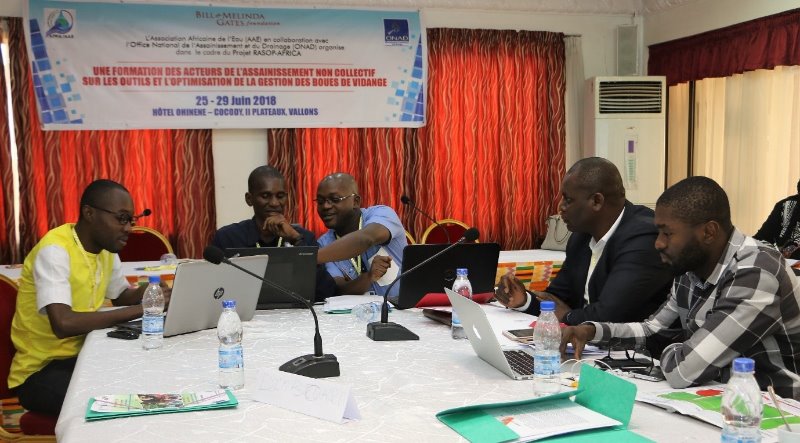 Training_A...an_1.jpg
(Filesize: 88KB)
Training_A...an_1.jpg
(Filesize: 88KB)
-
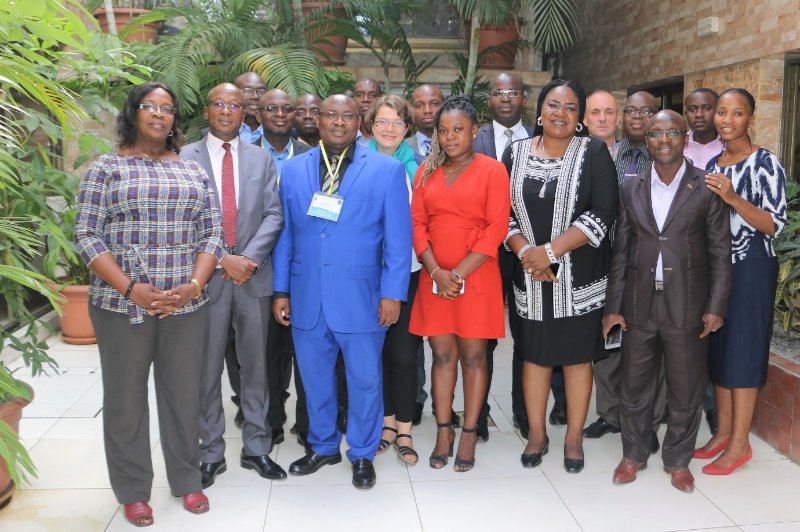 Training_A...an_2.jpg
(Filesize: 107KB)
Training_A...an_2.jpg
(Filesize: 107KB)
-
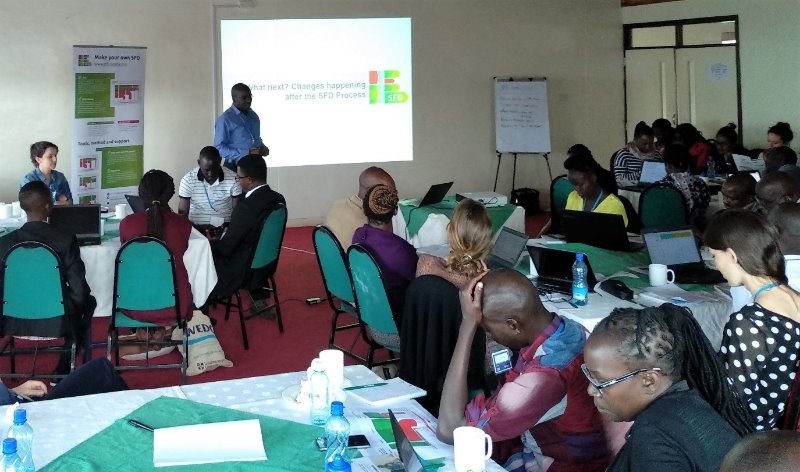 Training_Nakuru_1.jpg
(Filesize: 86KB)
Training_Nakuru_1.jpg
(Filesize: 86KB)
-
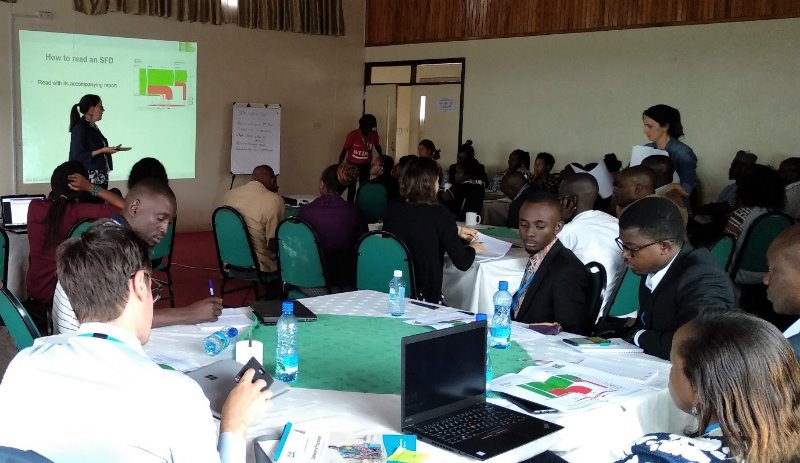 Training_Nakuru_2.jpg
(Filesize: 78KB)
Training_Nakuru_2.jpg
(Filesize: 78KB)
-
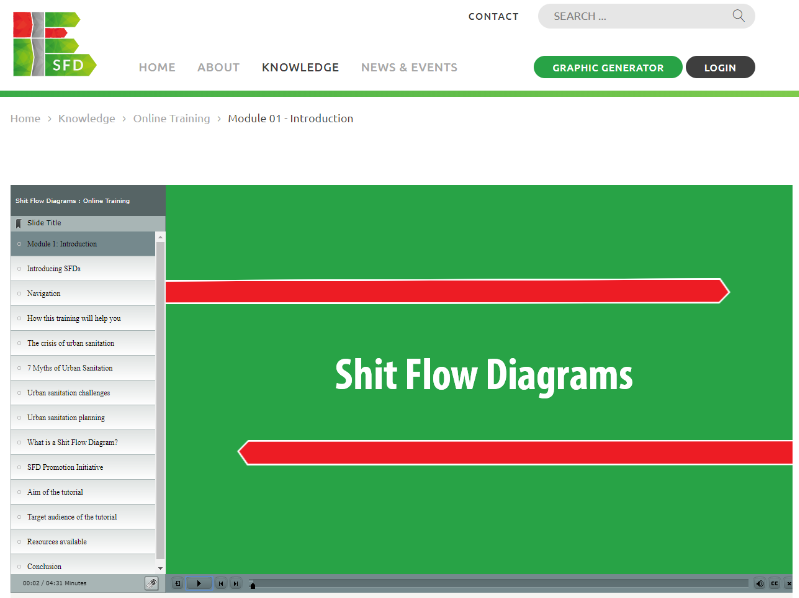 SFD_Online...ning.png
(Filesize: 71KB)
SFD_Online...ning.png
(Filesize: 71KB)
-
SFD_Data.PNG (Filesize: 61KB)
-
SFD_Manual...ions.PNG (Filesize: 219KB)
Please Log in to join the conversation.
You need to login to reply- Alix
-

- PhD student in Urban Sanitation Looking at regulation of emptying and transport services for faecal sludge in LMIC
Less- Posts: 12
- Likes received: 6
Re: SFD Promotion Initiative (SFD PI) - Project Updates (Shit Flow Diagrams)
Dear SuSanA Forum Users,
The SFD Promotion Initiative (SFD PI) (sfd.susana.org) would like to update you on our most recent activities and news.
Meeting in Bonn
The SFD PI met on May 8th and 9th in Bonn, Germany. The PI team showcased the work it had accomplished since the beginning of the project to its donors, such as the BMZ (German Federal Ministry for Economic Cooperation and Development) and GIZ’s direction of Global and Sector programs. The PI team also reviewed the work it had accomplished throughout Phase 2 of the SFD PI project and started planning ideas for the future of the project.
from left to right: Bhitush Luthra (CSE), Thilo Panzerbieter (GTO), Dr. Susanne Bieker (GIZ), Rebecca Scott (WEDC), Dr. Suresh Kumar Rohilla (CSE), Dr. Arne Panesar (GIZ), Radu Ban (BMGF), Dr. Linda Strande (Eawag), Alix Lerebours (WEDC), Cecilia Rodrigues (GIZ), Anna Kristina Kanathigoda (GIZ), Prof. Barbara Evans (UofL), Christène Razafimaharo (GIZ), Mintje Büürma (GIZ)
From left to right: Dr. Suresh Kumar Rohilla (CSE), Dr. Arne Panesar (GIZ), Franz Marré (BMZ)
New SFD Webportal
The SFD Webportal is getting a makeover – stay tuned for the upcoming launch of the new Webportal, with improved features to discover the world of SFDs.
SFDs Worldwide
Training on Effective Faecal Sludge and Septage Management for Mainstreaming Citywide Sanitation, Nimli, India – 29-31 May 2018
The Centre for Science and Environment (CSE) has conducted a two state-level training on FSSM at School of Water and Waste. Participants were technical functionaries from Odisha, Uttar Pradesh, Bihar and West Bengal. A 90 mins SFD session was included in the trainings. Moreover, this session was leaned on sensitization and promotion of SFD and to bring people to OLC who will show interest for the SFD.
SFDs in Afghanistan
SFD graphics and reports are currently under production for 6 of Afghanistan’s largest cities. This represents 72% of the country’s population. The SFDs were created by the municipalities themselves (under guidance of GIZ) and will be updated regularly to continue improving the local database. By discussing and developing the SFDs, the public utilities enhance their understanding and competence in wastewater treatment and faecal sludge management. The SFDs will also help to prioritize investments.
Upcoming!
Online course on preparation of the Shit Flow Diagram (SFD)
The e-course will provide hand on experience to state and non-state actors to prepare SFD for towns and cities. The course will give you the necessary knowledge to describe what an SFD could be used for, prepare your own SFD and use the tools and methods used for preparation of SFD graphic and report.
This training is intended for anyone who wishes to prepare an SFD report for a town or a city. Whether you are working for a local, regional or national government, an NGO, a University, or if you are just interested in learning more about SFDs, this training is for you.
You can apply here: www.cseindia.org/sfd-olc-8621
Online training for SFDs
The e-course will provide hand on experience to state and non-state actors to prepare SFD for towns. It will be available on the SFD Website this summer. We'll keep you updated!
Upcoming SFD report
Many SFD reports are near completion of the review procedure and will soon be published on our website. Stay tuned!
Doctoral researcher
WEDC
Loughborough University, UK
Attachments:
Please Log in to join the conversation.
You need to login to reply- Alix
-

- PhD student in Urban Sanitation Looking at regulation of emptying and transport services for faecal sludge in LMIC
Less- Posts: 12
- Likes received: 6
Re: SFD Promotion Initiative (SFD PI) - Project Updates (Shit Flow Diagrams)
March 2018
Dear SuSanA Forum Users,
The SFD Promotion Initiative (SFD PI) ( sfd.susana.org ) would like to update you on our most recent activities and news.
Would you have any questions, you can contact us at: This email address is being protected from spambots. You need JavaScript enabled to view it.
Live Q&A session and Call for SFDs
The SFD Promotion Initiative held the “Live Q&A session on the SFD Tools and Methods” on December 4th, 2018 at 14:00 CET. You can find the recording here:
It aimed at providing you with first-hand information that will ease the production of SFDs. This session was part of the ‘Call for SFDs’, an initiative to encourage and foster the production of SFDs worldwide.
The Call for SFDs allowed us to collect several SFD reports, which are now under review or already published on our website ( sfd.susana.org )!
Review Panel Meeting, Leeds (14-15 December 2017)
The University of Leeds hosted an SFD review panel. The SFD team reviewed new reports from different regions with the main objective of assessing and optimising the new review procedure and making the results of assessments available to a wider audience.
New SFD Reports
In the previous months, the SFD for Tikapur (Nepal) and for Patna (India) have been published on the SFD website.
You can find the SFD report for Tikapur here: sfd.susana.org/sfd-worldwide/cities/74
And the SFD report for Patna here: sfd.susana.org/sfd-worldwide/cities/75
Other reports are under review by the SFD team and will be published in the coming weeks. To submit your own SFD, visit and register on our website: sfd.susana.org/dashboard
Resources Updates
Updated template and guidance note for the SFD Lite report
As an addition to the three levels of SFD reporting explained in detail in the SFD Manual, the SFD lite is a simplified reporting template that summarises just the key information underlying your SFD graphic. It’s a 4 to 5 pages document including the SFD Graphic, brief contextual information and the record of data sources used. You can find the template and the guidance note here:
www.susana.org/en/knowledge-hub/resource...library/details/2357
The international publication 'Better World' of United Nations on SDG Goals - published a co-authored paper.
The paper and illustrations how SFD and other activities of water programme feed into SDGs as well as global processes and dialogues including how CSE Water Programme work connects with overall sustainable water management aimed at developing south-south partnership and/or north-south knowledge exchange on best management practices.
SFDs Worldwide
CSE is preparing SFD for Tema Metropolitan Assembly, Ghana (14-20 January 2018)
CSE’s team visited Tema from 14th to 20th January 2018. The objectives of the visit were to:
1. Understand the current initiatives by the Tema Metropolitan Assembly on Sanitation with a focus on wastewater and faecal sludge
2. Perform a reconnaissance survey to focus on understanding the on-ground situation of excreta and wastewater management practices in the metropolitan assembly
3. Collect any and all available baseline data which would help us in triangulation and presentation of the sanitation situation through our Shit flow graphic such that the metropolitan can act accordingly in improving the current scenario
Here are a few preliminary key findings from the field:
1. Tema Metropolitan has a mid-term action plan and a metropolitan environmental sensitivity plan which have an implementation span of 4 years. The two documents are used to prioritize the current area of focus, one of which is provisioning of toilets in line with a national level project (GAMA)
2. As per ground observations, there is humongous dearth of toilets, both public and household, in urban poor which is the heightened cause of open defecation and in turn, have increased diseases
3. The TMA has a community development office which is carrying out IEC activities to educate the citizens of the city regarding sanitation issues and providing skill development to empower people to earn, which in turn will help in increasing the standard of living among the vulnerable and poor
Ethiopia: SFD Preparation for Woliso
The University of Leeds is providing online support to Tetra Tech, a leading provider of consulting and engineering services working on sanitation in small towns in Ethiopia in an USAID-funded project. They have completed a baseline assessment and, since they want to produce a SFD for Woliso (Ethiopia), they requested our assistance to help them in the process.
Kenya: SFD preparation for Nairobi and other county governments
The University of Leeds is supporting APHRC and the Nairobi County Government to complete a consultative SFD for Nairobi. The final report and agreed SFD should be available in the next month, hopefully almost immediately for review on the website.
Also in Kenya, Nakuru County are in the process of updating their SFD and several other county governments have requested information about how to launch the process. At a recent national workshop on sanitation convened by the Ministry of Health and the World Bank, the SFD approach was presented to 50 representatives of county governments.
Ghana: Training on SFDs and Wastewater treatment
In February, Loughborough University (WEDC) assisted with training at KNUST, Kumasi, Ghana, as part of a ten-day programme on “Shit Flow Diagram (SFD) & Wastewater Treatment for Metropolitan, Municipal & District Assemblies (MMDAs)”. Training was provided jointly by staff from KNUST and WEDC, funded by UNICEF Ghana, to contribute to the professional development of MMDA staff. About twenty of the participants were engineers and planners from various Ghanaian municipalities and districts. They were joined by a few postgraduate students from KNUST University. All participants were fully engaged in the training, and evidently enjoyed it. The first two days of the course covered principles and practical applications of both SFDs and wastewater treatment methods.
Training on Preparation of Shit Flow Diagram (SFD)- For Improved Urban Sanitation Programming at City-Wide Scale
Centre for Science and Environment (CSE) is organizing a full day training on “Preparation of SFD” at the upcoming SuSanA India Chapter meeting, 2018 in Panaji, Goa. The training is for sanitation and faecal sludge management sector players, practitioners and city stakeholders who have the interest to learn about this tool.
The aim is to learn 'how to prepare SFD' by using newly developed SFD graphic generator for improved urban sanitation programming at city-wide scale. On completion of the training the participant will be able to:
• Understand SFDs (graphic and report) and the history of their development
• Understand the need for a standardized methodology
• Understand the available tools including their context, range and how to use them
• Use the developed tools to go through a worked example
• Understand the support available to enable the development of SFD for their city
You can find more information here: old.cseindia.org/content/training-prepar...hit-flow-diagram-sfd
Upcoming!
New translation of SFD video in Bahasa Indonesia
The video on SFDs prepared by Eawag ( sfd.susana.org/resources/videos-sfd#8AomexvJ-4c ) is in the process of being translated into Bahasa Indonesia by Urban Sanitation Development Program (USDP). The link will be shared on the SFD website once the video is ready.
Doctoral researcher
WEDC
Loughborough University, UK
Attachments:
Please Log in to join the conversation.
You need to login to reply- Alix
-

- PhD student in Urban Sanitation Looking at regulation of emptying and transport services for faecal sludge in LMIC
Less- Posts: 12
- Likes received: 6
Re: SFD Promotion Initiative (SFD PI) - Project Updates (Shit Flow Diagrams)
November 2017
Dear SuSanA Forum Users,
The SFD Promotion Initiative (SFD PI) (sfd.susana.org) would like to update you on our most recent activities and news.
Global Call for SFDs!
The SFD PI is proud to announce a global call for SFDs. Have you started preparing your own SFDs using the SFD Graphic Generator? Have you completed it? Where do you stand?
After a period of refinement and testing the tools for the production of SFDs (see below for more information), we would like to invite and encourage you to use out. We would like to give an extra push, so you can have your SFDs ready and used in your processes.
You can find the call for SFDs here: sfd.susana.org/news-events/events/108-global-call-for-sfds
Events Reports
Stockholm World Water Week
The SFD-PI was present in Stockholm this year and contributed to several activities and sessions:
• We organized the ‘SFD Exchange’ at the SuSanA booth between the 27th August and the 1st of September. Here are the presentations:
Indonesia:
Africa:
• In the double session “Safely managed sanitation in small towns: lessons from recent experiences and key challenges under scrutiny”, a couple of local experiences with SFDs were shared, amongst then, the experience of WaterAid on building capacity for urban sanitation planning in Ethiopia:
www.susana.org/en/knowledge-hub/resource...library/details/2875
• The session Operationalizing citywide inclusive sanitation: Right tools? Right use? addressed effectiveness and impact of certain tools, including SFDs at the city level. Link to documentation: citywideinclusivesanitation.wordpress.com/news/
Resources Updates
Here is a collection of new resources available on our website:
• The offline Graphic Generator
To complement the online Graphic Generator, an offline version (available for Mac and Windows) is now available! It will allow you to work on your SFD graphic even when you are not online, or when your internet is weak.
Mac: sfd.susana.org/graphic-generator/offlineversion/macosx
Windows: sfd.susana.org/graphic-generator/offlineversion/windows
• New SFD lite template
We are now providing an alternative to the three levels of SFD reporting explained in detail in the SFD Manual, the SFD Lite. The SFD Lite is a simplified reporting template that summarises just the key information underlying your SFD graphic.
www.susana.org/en/resources/library/details/2357
• New Review Procedure
The Review Procedure provides guidelines for SFD authors that would like to have their SFD reviewed by the SFD PI. The standardised review procedure offers you the possibility for having your work reviewed by peers and ensures that SFD graphics and reports meet some basic criteria and are of high quality. Finally, it enables you to have your SFD published on the SFD Portal contributing to the better understanding of excreta management worldwide.
www.susana.org/_resources/documents/defa...357-7-1510320026.pdf
• Source evaluation tool
The source evaluation tool is a tool that supports you in assessing the quality and credibility of the data sources used for preparing your SFD.
www.susana.org/en/resources/library/details/2357
• User’s check list
The User’s Checklist is a rapid assessment on your work, done by yourself. It consists of 16 questions.
www.susana.org/en/resources/library/details/2357
• Videos
The SFD-PI also produced two videos presenting the SFDs and their uses.
CSE video:
Indonesia videos:
SFDs Worldwide
India: Advocacy
CSE has been conducting Advocacy activities in India, promoting SFDs and the need for faecal sludge management.
• Meeting with Principal Secretary of Uttar Pradesh on 24/08/2017
cseindia.org/content/cse%E2%80%99s-initi...-principal-secretary
• CSE advocating FSM for non-sewered town/cities of UP at ‘Swachta hi Sewa’; dated: 19/09/2017
cseindia.org/content/cse-advocating-fsm-...hta-hi-sewa%E2%80%99
South Africa: Workshop Excreta Flow Diagram: A Sanitation Planning Tool (21 September 2017)
This workshop provided a background to the tool, how it aids sanitation planning, how to prepare one, and case examples. The WRC with the assistance of its stakeholders aims to apply the tool and its standardised methodology in South Africa with the ultimate objective of performing a national diagnosis of excreta management and establishing the regional capacity within South Africa to prepare high-quality excreta flow graphics.
CSE, one of the partners of the initiative, introduced the tool and provided training on how to prepare an SFD for their province, city or town.
cseindia.org/content/excreta-flow-diagra...tation-planning-tool
Bangladesh: Faecal Sludge and septage management training, Bangladesh (06-09 November 2017)
CSE and Water Aid Bangladesh (WAB) jointly organised a 3-days training programme for capacity building of practitioners, academicians and government officials from Bangladesh on Faecal Sludge and Septage Management (FSSM). The goal was to create an enabling environment for mainstreaming FSSM in Bangladesh and across South Asia.
cseindia.org/content/training-faecal-slu...ge-management-fssm-0
Zambia:
The University of Leeds provided online support on the REACH program: “A situational analysis of the water security, sanitation and hygiene status of Kafue district”, including the development of a SFD for the city of Kafue (Zambia), in collaboration with the University of Zambia, the London School of Hygiene and Tropical Medicine and the Centre for Infectious Disease Research on Zambia.
Mali: Make your own SFD training
As part of the RASOP project from the African Water Association, ten participants from five mentee cities and two from two mentor cities attended a training in Bamako on Shit Flow Diagrams. The trainers from GIZ and WEDC gave them the tools and methodology needed to produce their own SFD.
Upcoming!
Live Q&A session on the SFD Tools and Methods (4th December 2017)
The SFD Promotion Initiative is glad to invite you for the “Live Q&A session on the SFD Tools and Methods”. Please join us December 4th, 2018 at 14:00 CET.
We would like to provide you with first-hand information that will ease the production of SFDs. This session is part of the ‘Call for SFDs’, an initiative to encourage and foster the production of SFDs worldwide. In this live session, the SFD Promotion Initiative will be happy to present you the most recent versions of the guidance documents, including the SFD Manual – volume 1 and 2 and the SFD Review Procedure. We will then answer all the questions you may have about SFDs. Please join us!
Registration link: www.susana.org/en/sfd-question-session
New SFD Reports
CSE has prepared comprehensive SFD reports of 10 Ganga basin cities (Chunar, Gangaghat, Katihar, Muzzafarpur, Ramnagar, Bansberia, Bijnor, Bodhgaya, Bongaon, Buxar). They have been submitted and will soon be one the webpage.
Review Panel Meeting, Leeds (14-15 December 2017)
The University of Leeds will host the SFD review panel. The SFD team will review new reports from different regions with the main objective of assessing and optimising the new review procedure and making the results of assessments available to a wider audience.
Any other business
SFDs at FSM toolbox
Since early October, the SFD approach composes the suite of tools available in the FSM Toolbox, developed by the Asian Institute of Technology (www.fsmtoolbox.com/view-all-tools/?first-filter=tools)
SFDs at the MEDS Annual Convening 2017
Arne Panesar (GIZ) on behalf of the SFD PI has presented and discussed the SFD approach at the convening The Bill & Melinda Gates Foundation on November 6-10, 2017, in Patna, India. The annual convening of Foundation gathers grantees and partners engaged in developing, exploring and testing sanitation service delivery. The focus of the convening is on sharing and learning and the location that is selected each year offers opportunities for field visits and local engagement.
Cactus
University of Leeds has recently started working on a separate project in partnership with BMGF. The CACTUS project is looking at costs of urban sanitation systems.
Doctoral researcher
WEDC
Loughborough University, UK
Attachments:
-
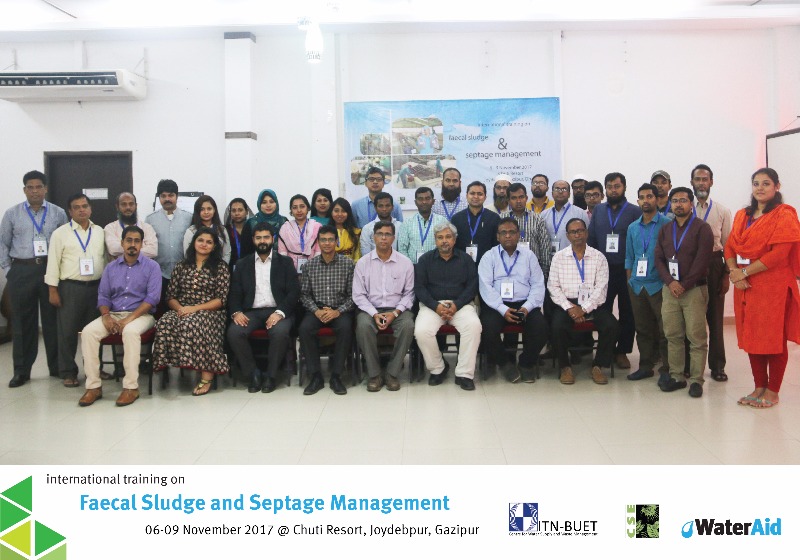 171105FSSM...7-01.jpg
(Filesize: 150KB)
171105FSSM...7-01.jpg
(Filesize: 150KB)
-
 trainingphoto.png
(Filesize: 1,031KB)
trainingphoto.png
(Filesize: 1,031KB)
Please Log in to join the conversation.
You need to login to reply- Markets, finance and governance
- Cities (planning, implementation, and management processes)
- Shit flow diagrams (SFDs) / Excreta flow diagrams
- SFD Promotion Initiative (SFD PI) - Project Updates (Shit Flow Diagrams)








